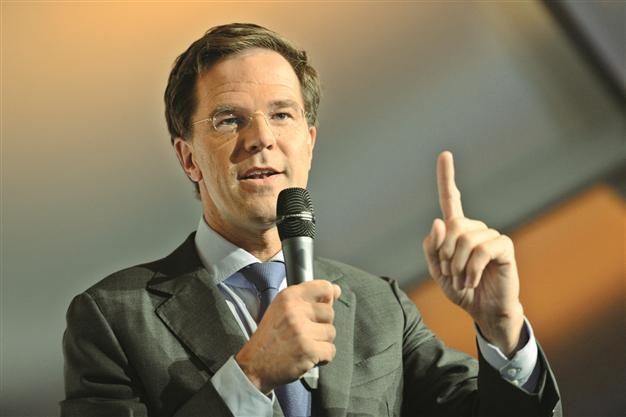Not Islamophobia, change is Europe’s woe: Dutch PM
THE HAGUE

Some in Europe is afraid of change, Holland’s conservative PM Rutte says. AP photo
The main problem in European countries is not xenophobia or Islamophobia, but rather the struggle between people adapting to changing situations and those who are concerned about change, according to Dutch Prime Minister Mark Rutte.
“I believe that in many countries people have become worried. Not about Islam or ethnicities - that’s not the issue - the issue is that things are changing, society is changing,” Rutte told a group of visiting Turkish journalists in his office in The Hague on Sept. 26.
Rutte believes that popular parties should play the role of mediator between those two groups.
“My party [the People’s Party for Freedom and Democracy (VVD)], as a traditional people’s party- and other major political parties such as the Labor Party [PvdA] and the Christian Democratic Party [CDA] - should be building bridges between those people in the Netherlands who are well-educated and can adopt to such changes and those who are worried about them,” Rutte said. “That is something my party has failed to do in the last 10 years, but we are again trying to do it.”
He said such issues should be openly discussed by political parties to overcome potential tensions in the society.
Rutte’s liberal party, the VVD, was the top party in the latest Dutch elections held on Sept. 12, winning 41 seats in the 150-seat Parliament. The PvdA came second with 38 seats and talks are underway to form a coalition government between the two.
The Dutch prime minister will be visiting Turkey in early November
, and he believes that Turkey’s role as a bridge between the West and the Islamic world, as well as the two countries’ 400 years of diplomatic relations, will help bilateral relations flourish.
“My visit will focus on trade, but our relationship is much broader than just economic ties,” said Rutte. “Turkey was one of our allies centuries ago when we fought for independence from Spain. And, as everyone knows, the tulip, our national symbol, was imported from Turkey.”
Impact of presidential visitAccording to Rutte, Turkish President Abdullah Gül’s visit to the country in April, in which he and his wife Hayrünnisa Gül were hosted by Queen Beatrix, was a success in helping develop ties.
“The Netherlands ranks among the top three foreign investors in Turkey with some 2,000 Dutch firms investing in the country,” Rutte told the journalists.
“We have great respect for the international role that Turkey plays in promoting peace and security, and the Dutch and Turkish armed forces have been working together for 60 years within NATO,” the prime minister said.
“The Netherlands values the active role Turkey is playing in the Arab region, its efforts to put an end to the terrible violence in Syria, and in hosting refugees from Syria,” said Rutte.
The Dutch government is currently trying to cope with the affects of the global crisis, but Rutte is optimistic about the future of Euro.
“We will still face rough times, for 12 to 18 months, but after that I’m optimistic,” Rutte said, adding that giving up austerity measures was out of the question.
“We have to bring spending down and keep a healthy budget,” he said. “People are afraid of spending money and we have problems with the pension system. Austerity measures are necessity for the Netherlands and other European countries.”
Optimistic about EurozoneDespite the optimism, the Dutch prime minster said his government was not willing to pay for a third package to save Greece.
“We know there is a gap between the northern European countries and the southern countries such as Greece and Spain,” said Rutte. “We are willing to help them help themselves, because it is in our interest to keep the Eurozone intact, and we expect them to do what is necessary.”
Rutte also said Portugal and Ireland were in a better position than they were two years ago and were “no longer facing the abyss,” adding that the outcome of the upcoming Troika report would be an important indicator about the direction in which Greece is heading.
